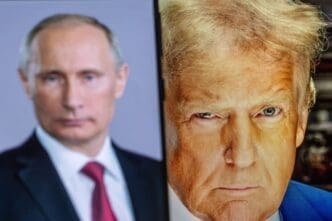Executive Summary
The Story So Far
Why This Matters
Who Thinks What?
President Donald Trump recently canceled a planned summit with Russian President Vladimir Putin in Budapest, opting instead to impose new sanctions on Moscow. The reversal came after Trump’s assessment that Putin’s stance on ending the war in Ukraine had not significantly shifted, despite initial hopes following a phone conversation between the two leaders last week. The sanctions target Russia’s two largest oil companies, Rosneft and Lukoil, marking the first such measures of Trump’s second administration.
Trump had initially expressed optimism after his call with Putin, publicly announcing his intention to travel to Budapest for an in-person meeting. However, within five days, his perspective changed as top officials and the President himself realized Putin’s demands for an end to the conflict remained maximalist, coupled with continued strikes on Ukrainian civilians and a refusal to agree to an immediate ceasefire. “It just didn’t feel right to me,” Trump stated, explaining his decision to cancel the summit.
The sudden policy shift was met with approval from President Trump’s European allies and many of his domestic supporters, while President Putin condemned the new measures as unhelpful. Trump, who had previously hesitated to impose severe penalties on Russia, indicated that the time was right for stronger action. “I just felt it was time,” Trump said, adding, “We waited a long time.”
Behind the Policy Reversal
According to a senior White House official, there was no single incident that prompted the President’s change of heart. Instead, his view evolved out of repeated disappointments that Putin appeared no closer to agreeing to an end to the war. Trump articulated his frustration, saying, “Every time I speak with Vladimir, I have good conversations, and then they don’t go anywhere.”
Key Diplomatic Engagements
The President’s decision followed a series of critical diplomatic engagements. On October 17, Trump met with Ukrainian President Volodymyr Zelensky in a tense White House lunch. While the meeting did not secure long-range Tomahawk missiles for Ukraine, it concluded with a plan for a ceasefire at the current battle lines, a position less demanding than Putin’s full peace terms.
Subsequently, a phone call on Monday between Secretary of State Marco Rubio and Russian Foreign Minister Sergey Lavrov further clarified Moscow’s unyielding position. This conversation reportedly solidified American officials’ understanding that Russia’s stance had not moved, leading Trump to speculate that a Budapest summit would be a “waste of time.” Planning for the summit was then halted.
Sanctions Implementation and International Reaction
Ahead of the sanctions announcement on Wednesday, President Trump met with Treasury Secretary Scott Bessent, a proponent of tougher measures against Russia for months. To the surprise of some close advisors, Trump agreed to target Rosneft and Lukoil, Russia’s largest oil companies. Bessent then briefed his team to prepare the official announcement.
NATO Secretary General Mark Rutte, who visited the Oval Office on Wednesday, received the news directly from President Trump. Rutte, acting as an emissary for European leaders, could hardly have hoped for a stronger outcome. Trump emphasized the significance of the new measures, stating, “These are very big, those are against their two big oil companies, and we hope that they won’t be on for long. We hope that the war will be settled.”
White House Motivations and Political Context
The swift implementation of the sanctions surprised many within the White House. Advisors indicated that Trump’s “instincts” played a role, alongside the ongoing reports of extensive Russian bombing in Ukraine, including a strike on a kindergarten in Kharkiv hours before the announcement. The President was also reportedly influenced by his recent success in brokering a truce in Gaza, where he believed a tougher stance on Israeli Prime Minister Benjamin Netanyahu led to action.
President Trump had faced consistent encouragement from Republican allies, including Senator Lindsey Graham and Senate Majority Leader John Thune, to impose sanctions. While Trump had threatened such measures since retaking office in January, he had previously expressed concerns that tough new sanctions might deter Putin from peace talks. This concern was echoed by Secretary of State Rubio in August. Though Trump had previously applied tariffs on India for its Russian oil purchases, similar measures were not imposed on China as he pursued a new trade deal with President Xi Jinping.
This week’s decision marks a significant shift in President Trump’s approach to Russia and the ongoing conflict in Ukraine. While the permanence of this new stance remains an open question, the White House has not ruled out future meetings with President Putin, provided they can yield a “tangible, positive outcome” and represent a productive use of the President’s time.








